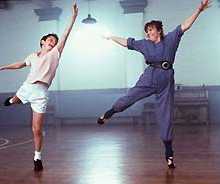

|
Billy Elliot
9 out of 10 |
 |
|
Dunces And Dances "Billy Elliot" is a microcosm. In an obvious allegory to Britain of the 1980's, a young boy wishes to explore something new exciting, productive and artistic, only to be permanently obstructed and ruined by the ignorance of the old. In one telling scene, his father takes their piano, and, instead of selling it for a lot of money for food, smashes it up for firewood, a stunning symbolism of the Philistine - a scene that closely ressembles "October Sky", but here, the miners are to offer no jovial encouragement. Set at the time of the Great Coal strike of 1983-4, it paints a powerful portrayal of the unique evil of the National Union Of Mineworkers and its ignorant thuggery that did my country so much harm and hurt so, so many.. Striking for jobs would seem to any reasonable person about as oxymoronic as bonking for chastity, but that's exactly what the scum of Britain's National Union Of Mineworkers (NUM) did in 1984. Throughout the industrial revolution, coal had left its miners the masters of British industry, and with it, an entire culture of a "man's life", more worthless it is hard to conceive, had grown up. Reaching down to almost tribal roots, it centred on boozing with "the lads", gay-bashing and drunken thuggery at football matches. By the 1980's the world above ground had very much changed. With steam power long gone, no-one wanted coal any more, and worse, after hundreds of years of mining, what little there was left was so punatively expensive, it was cheaper to ship it in from the other side of the world to the pithead than bring it to the surface. Taxes neccessary to subsidise these fiscally bottomless pits were bankrupting the nation, with those on people trying to build new businesses passing 99% at one point in the 1970's. Despite Prime Minister Thatcher trying to help with laws to force electricity generators to buy British coal, the first attempt at reform of the industry triggered this strike. The NUM's Communist leader, Arthur Scargill, picked up a baseball bat and made it clear that if they couldn't be assured of blank cheque for eternity, they would start smashing in heads until they got it. For nearly a year, the mines stayed closed and the hospitals were packed every day with scores of injured Policemen, savagely beaten by Scargill's thugs in riot after riot. Places like the ghettos of Detroit in the USA looked like islands of calm compared with the wrecked cities of the North-East of England. By the time the strike was over, the industry stood in ruins with hundreds of vandalised pits forced to close for ever, dozens were crippled for life, two men had been beaten to death and a taxi driver had been ritualistically decapitated for driving those prepared to work to the pits. With his mother long dead, Billy lives with his father and elder brother, both typical NUM strikers, chunks of utter ignorance. Despite being an honest young boy, he is daily confronted with violence. In one scene for instance, the two of them threaten a man prepared still to work for a living in a corner store and in another, his brother decides in the middle of the night to go out and start smashing Policemen's facesn with a hammer. His father's response? Rather than reason with hinm, just punch him out as he's challenging his authority. Forced to go to learn boxing by his "macho" father, he has an unexpected break. To accommodate a soup kitchen for the miners too lazy to work at the civic centre, a ballet class has been moved up to share the same floor as his boxing lessons. Quickly he finds the passion of his life, ballet and, in secret with out his father knowing, he tries to pursue his dream, only to be pushed onto a table to be taunted by his brother with extreme gay-bashing abuse and to be given a vicious hiding by his father. Can he and his coach overcome this for a chane at the auditions for a scholarship to a ballet school? Or will the ignorance of the NUM succeed? Produced by Working Title Films, known better for "Notting Hill" and "Wimbledon", the film features a strong supporting cast including Julie Walters as Mrs Wilkinson and Gary Lewis (Joyeux Noel) as Billy's father, This, however, is not the only reason why the film never fails to pull a tear. Directed by none other than Stephen Daltry, the renown London stage director, "Billy Elliot" closely mirrors the real life of Jamie Bell as Billy. Never knowing who his father was, and having been bought up in the tough streets of Stockton-On-Tees, Jamie had likewise keep it a secret his passion an undoubted ability as a dancer and was adopted by Daltry as his son in real life during shooting of the movie. Written by Lee Hall, himself from Newcastle-Upon-Tyne, "Billy Elliot" also has a rare depth for a movie of this genre. Not only are there the personal and external challenges for the central character, but also for his coach, whose life is parodied in the film by the story of the Tchaikovsky's ballet "Swan Lake".as well as his friendship with Michael who, unlike Billy, actually is gay. With "London Calling" by "The Clash" and half a dozen hits from Marc Bolan to back it and employing the dialect coach Jill McCullough (known more recently her work on "Sin City" and "28 Days Later"), the film recreates faithfully the painful days of the Great Coal strike in the North-East of England. Indeed, Daltry had to hire a team of no less than 15 stuntmen to recreate the violence of the NUM..
Film Critic: Robert L Thompsett
|
|